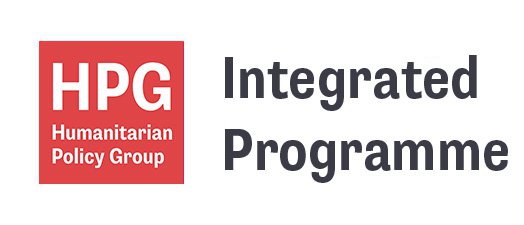HPG Integrated Programme 2011-13
For the 2011–13 Integrated Programme, HPG proposes to focus on specific issues of particular current significance to the sector, and which reflect the expertise within the team.The new research agenda builds on previous work as well as adding new strands of analysis:
- Resilience and humanitarian action;
- Humanitarian negotiations with armed non-state actors;
- Civil-military coordination in disaster management and for the protection of civilians in armed conflict;
- Global history of humanitarian action.
This first project responds to the need to understand better the impact of humanitarian action on people’s resilience to crisis. Resilience and resilient livelihoods are becoming a focus of humanitarian and development agencies seeking to address the underlying fragilities that turn shocks and stresses into humanitarian crises. It is less clear what makes people resilient in protracted crises and how resilience can be ‘built’. It is also unclear what role humanitarian assistance can play given that the resilience of livelihoods is mainly determined by longer-term development processes. Previous HPG research on humanitarian assistance and livelihoods has shown that the importance of the non-material aspects of livelihoods (institutions, power, protection) is underestimated, especially by humanitarian actors. What effect would this tendency have on analysis of resilience?
A major new action research project is proposed to understand how aid agencies engage in negotiations with armed non-state actors. The project examines issues and country case studies that illuminate this engagement in difficult political and security environments, including what lessons can be learned from past experience of negotiations and dialogue with armed non-state actors to secure assistance and protection. It also examines the potential risks involved in such engagement, including the moral dilemmas that often arise and the compromises that agencies must make in order to gain access to people in need.
Building on research by HPG on stabilisation, UN integration and humanitarian space, the proposed research on military engagement considers how recent developments in the humanitarian and military/police communities have affected civil–military coordination. It aims to develop a shared understanding between international military and humanitarian actors of their responsibilities and areas of competence as they relate to humanitarian action, and inform more effective and principled coordination between international military and humanitarian actors at policy, strategic and operational levels.
The global history of modern humanitarian action project seeks to identify and understand the principal changes in policy, practice and institutional architecture that the humanitarian sector has undergone since the beginning of the twentieth century. The aim is to help the sector better understand its history and make greater use of historical analysis and lessons in current discussions and debates aimed at improving humanitarian action.
The non-research dimensions of the Integrated Programme are crucial elements of our strategy and communication work. In particular the Humanitarian Practice Network (HPN) represents our most important link with practitioners, and is widely recognised as an invaluable asset for the sector as whole. Our Advanced course on conflict, crisis and transition, in collaboration with the Post-War Reconstruction and Development Unit (PRDU) at York University, continues to attract international policy-makers and practitioners. In 2012 the course will also be held in the Asia-Pacific region to extend its reach and strengthen Southern engagement. As part of the Integrated Programme, HPG continues its advisory work wtih policy makers and donors and its extensive public affairs engagement.
Staff
-
Simon Levine
Senior Research Fellow
-
Wendy Fenton
Senior Research Fellow and HPN Coordinator
-
Lilianne Fan
Research Associate
-
Sara Pantuliano
Chief Executive
